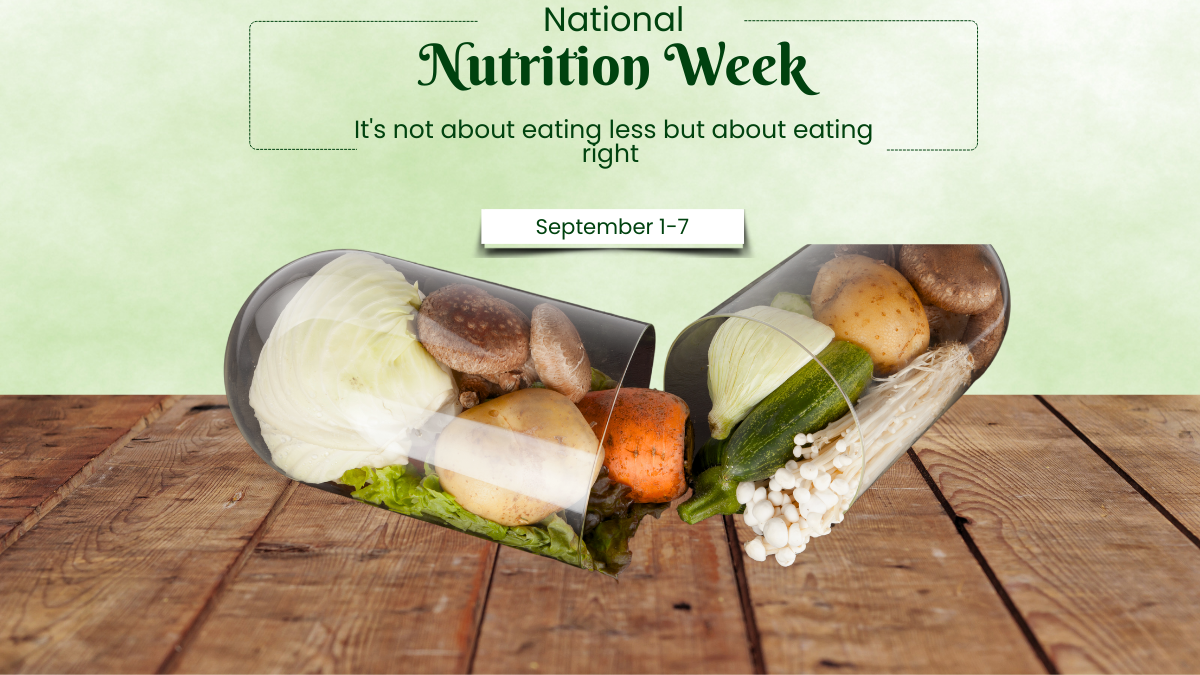National Nutrition Week (NNW) is an annual observance in India, taking place from September 1 to 7. This week-long event is dedicated to raising awareness about the critical role of nutrition in our lives and promoting healthy eating habits among people of all ages. The primary objectives of National Nutrition Week are:
- To educate the public about the importance of proper nutrition
- To encourage the adoption of healthier dietary practices
- To support overall health and well-being across diverse population groups
By focusing on these goals, National Nutrition Week aims to contribute to a healthier future for individuals and communities alike.
Understanding a Healthy Diet
A healthy diet is fundamental to maintaining good health and preventing various diseases. According to the World Health Organization (WHO), a balanced and nutritious diet plays a crucial role in:
- Preventing malnutrition in all its forms
- Reducing the risk of noncommunicable diseases (NCDs)
- Promoting overall well-being
Key Components of a Healthy Diet
A well-balanced diet typically includes a variety of foods that provide essential nutrients while staying within appropriate calorie limits. The basic principles of a healthy diet remain consistent, although specific requirements may vary based on individual factors such as:
- Age
- Gender
- Lifestyle
- Level of physical activity
- Cultural context
- Locally available foods
- Dietary customs
Essential Food Groups
A healthy diet should incorporate the following food groups:
- Fruits and vegetables
- Legumes
- Nuts
- Whole grains
By including these food groups in your daily meals, you can ensure a diverse range of nutrients that support optimal health.
WHO Recommendations for Nutritional Intake
The World Health Organization has established guidelines for nutritional intake to promote health and prevent diseases. Let’s explore these recommendations in detail:
1. Fruits and Vegetables
Recommended intake:
- For individuals 10 years and older: At least 400 g or 5 portions per day
- For children 2-5 years old: At least 250 g per day
- For children 6-9 years old: At least 350 g per day
Benefits:
- Reduces the risk of noncommunicable diseases
- Ensures adequate daily intake of dietary fiber
Note: This recommendation excludes potatoes, sweet potatoes, cassava, and other starchy roots.
2. Fats
Recommended intake: Less than 30% of total energy intake should come from fats
Benefits:
- Prevents unhealthy weight gain in adults
- Lowers the risk of developing noncommunicable diseases
3. Salt, Sodium, and Potassium
Recommendation: Reduce sodium intake and increase potassium consumption
Rationale:
- High salt consumption and insufficient potassium intake can contribute to high blood pressure
- Balancing these minerals is crucial for cardiovascular health
4. Sugars
Recommended intake:
- For both adults and children: Reduce free sugar intake to less than 10% of total energy intake
- Ideally, aim for less than 5% of total energy intake for additional health benefits
Benefits:
- Decreases the risk of dental caries
- Helps prevent unhealthy weight gain
5. Carbohydrates
Recommendation: Carbohydrates should primarily come from:
- Whole grains
- Fruits
- Vegetables
- Pulses
Target group: Everyone two years of age and older
6. Fiber
Recommended intake:
- Adults: At least 25 grams of naturally occurring dietary fiber per day
- Children 2-5 years old: At least 15 grams per day
- Children 6-9 years old: At least 21 grams per day
The Impact of a Healthy Diet
Adopting a balanced and nutritious diet can have far-reaching effects on an individual’s health and well-being. Some of the key benefits include:
- Disease Prevention: A healthy diet can significantly lower the risk of various noncommunicable diseases, including:
- Heart disease
- Stroke
- Diabetes
- Certain types of cancer
- Weight Management: By consuming appropriate portions of nutrient-dense foods, individuals can maintain a healthy weight and reduce the risk of obesity-related health issues.
- Improved Digestive Health: A diet rich in fiber promotes good digestive function and helps prevent gastrointestinal problems.
- Enhanced Mental Health: Proper nutrition has been linked to better cognitive function and a reduced risk of mental health disorders.
- Stronger Immune System: A balanced diet provides essential nutrients that support immune function, helping the body fight off infections and diseases.




 National Science Day 2026: Honouring the...
National Science Day 2026: Honouring the...
 World NGO Day 2026: Why February 27 Matt...
World NGO Day 2026: Why February 27 Matt...
 International Polar Bear Day 2026: Why P...
International Polar Bear Day 2026: Why P...








